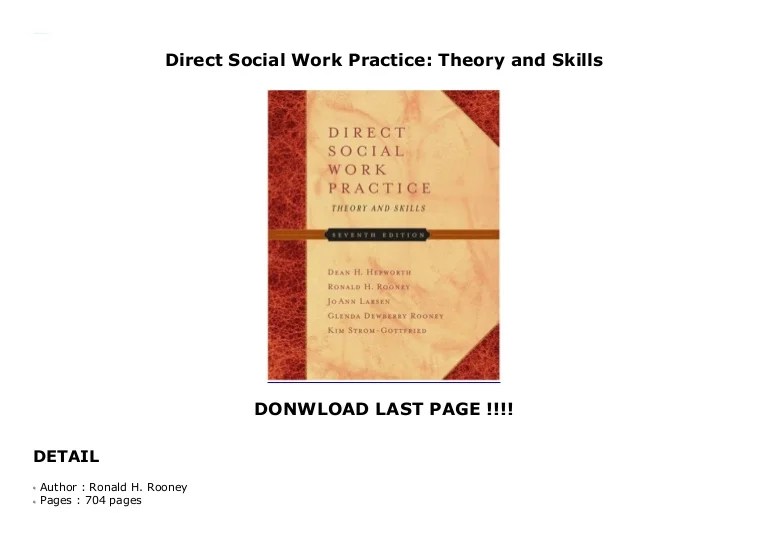Direct social work practice theory and skills 11th edition – Direct Social Work Practice Theory and Skills, 11th Edition, unveils a comprehensive exploration of the principles, methodologies, and ethical considerations that shape the field of social work. This definitive guide provides a profound understanding of the theoretical foundations, assessment and engagement strategies, intervention and treatment planning techniques, and evaluation and termination processes that are essential for effective social work practice.
Through engaging narratives and practical examples, this book delves into the intricacies of direct social work practice, equipping readers with the knowledge and skills necessary to navigate the complexities of human behavior and promote positive change in individuals, families, and communities.
1. Theoretical Foundations of Direct Social Work Practice

Direct social work practice is a method of helping people in need by providing them with direct services, such as counseling, case management, and crisis intervention. It is based on the principles of social justice, human rights, and self-determination.
Historical Development and Evolution of Direct Social Work Practice
The roots of direct social work practice can be traced back to the late 19th century, when social workers began to provide services to the poor and disadvantaged. In the early 20th century, social workers began to develop more formalized methods of practice, such as casework and group work.
Core Values and Ethical Considerations
Direct social work practice is guided by a set of core values, including social justice, human rights, self-determination, and confidentiality. Social workers must also adhere to a code of ethics that governs their conduct and practice.
2. Assessment and Engagement in Direct Social Work Practice

Assessment is the process of gathering information about a client’s needs and strengths. It is an essential part of direct social work practice, as it helps social workers to develop a treatment plan that is tailored to the client’s individual needs.
Methods and Techniques of Assessment
There are a variety of methods and techniques that social workers can use to assess clients. These include interviews, observations, and psychological testing.
Importance of Engagement
Engagement is the process of building a relationship with a client. It is essential for effective social work practice, as it helps to create a safe and trusting environment in which the client can feel comfortable sharing their thoughts and feelings.
3. Intervention and Treatment Planning in Direct Social Work Practice
Intervention is the process of providing services to clients to help them achieve their goals. There are a variety of interventions that social workers can use, including counseling, case management, and crisis intervention.
Types of Interventions
The type of intervention that a social worker uses will depend on the client’s needs and goals. Some common types of interventions include:
- Counseling
- Case management
- Crisis intervention
- Group work
- Advocacy
Treatment Planning
Treatment planning is the process of developing a plan that Artikels the goals of intervention and the steps that will be taken to achieve those goals. Treatment plans are typically developed in collaboration with the client.
Evidence-Based Practice, Direct social work practice theory and skills 11th edition
Evidence-based practice is the use of research to inform social work practice. Social workers should use the best available evidence to make decisions about the interventions they use.
4. Evaluation and Termination in Direct Social Work Practice
Evaluation is the process of assessing the effectiveness of an intervention. It is an essential part of direct social work practice, as it helps social workers to determine whether their interventions are meeting the client’s needs.
Methods and Techniques of Evaluation
There are a variety of methods and techniques that social workers can use to evaluate their interventions. These include:
- Client feedback
- Outcome measures
- Process measures
Termination
Termination is the process of ending a social work relationship. It is an important part of direct social work practice, as it helps to ensure that the client has the resources and support they need to continue their progress after the relationship has ended.
5. Skills for Direct Social Work Practice: Direct Social Work Practice Theory And Skills 11th Edition

Effective direct social work practice requires a variety of skills. These skills include:
- Communication skills
- Empathy
- Active listening
- Reflective practice
- Cultural competence
- Critical thinking
- Problem-solving
Importance of Communication Skills
Communication skills are essential for effective social work practice. Social workers must be able to communicate effectively with clients, colleagues, and other professionals.
Empathy and Active Listening
Empathy is the ability to understand and share the feelings of another person. Active listening is the process of paying attention to what someone is saying and reflecting back what you have heard.
Reflective Practice
Reflective practice is the process of reflecting on your own practice to identify areas for improvement. It is an essential part of professional development.
FAQ Compilation
What are the core values that guide direct social work practice?
Direct social work practice is guided by core values such as respect for human dignity, social justice, confidentiality, self-determination, and cultural competence.
What are the key principles of effective crisis intervention?
Effective crisis intervention involves assessing the situation, establishing safety, providing support, developing a plan, and following up to ensure the well-being of the individual in crisis.
What are the different types of groups used in direct social work practice?
Social work groups can be classified into various types, including task groups, support groups, psychoeducational groups, and therapy groups.